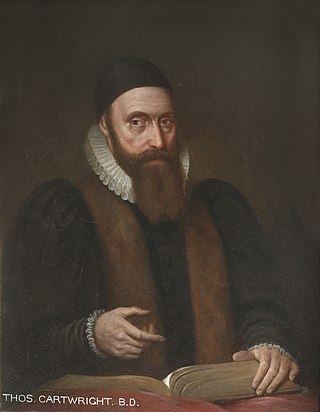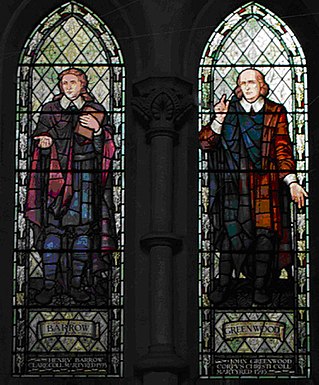Related Research Articles

John Whitgift was the Archbishop of Canterbury from 1583 to his death. Noted for his hospitality, he was somewhat ostentatious in his habits, sometimes visiting Canterbury and other towns attended by a retinue of 800 horses. Whitgift's theological views were often controversial.

Thomas Cartwright was an English Puritan preacher and theologian.

John Greenwood was an English Separatist Puritan, or Brownist, minister and was executed for his faith. He led the London Underground Church from 1587 to 1593 and wrote several works of Brownist apologetics, working closely with Henry Barrow.

Lawrence Humphrey DD was an English theologian, who was President of Magdalen College, Oxford, and Dean successively of Gloucester and Winchester.

John Richardson was a Biblical scholar and a Master of Trinity College, Cambridge from 1615 until his death.
Francis Mallet was an English churchman and academic, and chaplain to Mary Tudor.
Thomas Sedgwick (Segiswycke) was an English Roman Catholic theologian. An unfriendly hand in 1562 describes him as "learned but not very wise".

John Jegon was an English academic and Bishop of Norwich. He supported uniformity of Anglican doctrine and worship, and strong government. This led him into conflict with John Robinson, later pastor to the Mayflower emigrants. On the other hand, he made efforts to satisfy local Puritans by the appointment of preachers in his diocese. Nicholas Bownd dedicated to him a work on doctrine of Sabbath.
Robert Some (Soame) (1542–1609) was an English churchman and academic. Master of Peterhouse, Cambridge from 1589, Some played a prominent part in the ecclesiastical controversies of his time, taking a middle course, hostile alike to extreme Puritans and Anglicans.

John Young (1514–1580) was an English Catholic clergyman and academic. He was Master of Pembroke Hall, Cambridge, and was later imprisoned by Elizabeth I. He is not John Young (1534?–1605), Master of Pembroke Hall later in the century, and afterwards Bishop of Rochester.
Andrew Boardman was an English clergyman who was a minister at St. Mary's Church, Bury St. Edmunds as well as a vicar at Collegiate Church of St Mary, Warwick.
John Madew was an English churchman and academic, Regius Professor of Divinity at Cambridge and Master of Clare Hall.
John Sanderson was an English Roman Catholic priest, known as a writer on logic.
William Buckmaster was an English cleric and academic, three times vice-chancellor of the University of Cambridge.
Francis Newton was an English clergyman who served as Dean of the Winchester Cathedral from 1565 until his death in 1572.
Edmund Steward otherwise Stewart or Stewarde was an English lawyer and clergyman who served as Chancellor and later Dean of Winchester Cathedral until his removal in 1559.
Thomas Braddock or Bradock was an Anglican clergyman of the 16th century, Headmaster of Reading School from 1588 to 1589 and a translator into Latin.

Henry Butts, D.D. (1573–1632) was a priest and academic in the second half of the sixteenth century and the first decades of the seventeenth.
Thomas Cosyn was a priest and academic in the late fifteenth and early sixteenth centuries.
Richard de Billingford was Chancellor of the University of Cambridge, holding the position three times, from 1400–1402, 1406-1413 and in 1432.
References
- 1 2 3 4 5 6 7 Cooper, C.H.; Cooper, T. (1861). Athenae Cantabrigienses volume 2: 1586-1609. Cambridge: Deighton, Bell & Co. pp. 94–95. Retrieved 24 August 2014.
- ↑ "Copcot, John (CPCT562J)". A Cambridge Alumni Database. University of Cambridge.Athenae Cantabrigienses notes that John’s brother left a bequest to Corpus Christi College; that brother is almost certainly Reynold Copcott (known to be son of Adam Copcott and his wife Elizabeth Lynne) whose will dated 1598 did leave money to both Corpus Christi College and Trinity College.
- 1 2 3 4 "Copcot, John". Oxford Dictionary of National Biography (online ed.). Oxford University Press. doi:10.1093/ref:odnb/6248.(Subscription or UK public library membership required.)
- ↑ "John Copcott". Clergy of the Church of England Database 1540-1835 . Retrieved 24 August 2014.
- 1 2 3 4 Masters, Robert; Lamb, John (1831). Masters' History of the College of Corpus Christi and the Blessed Virgin Mary in the University of Cambridge: With Additional Matter and a Continuation to the Present Time by John Lamb. Cambridge: John Smith. pp. 136–143.
- ↑ Fuller, Thomas (1840). Prickett, Marmaduke; Wright, Thomas (eds.). The history of the University of Cambridge, from the Conquest to the year 1634. Cambridge: Cambridge University Press. p. 103. Retrieved 24 August 2014.